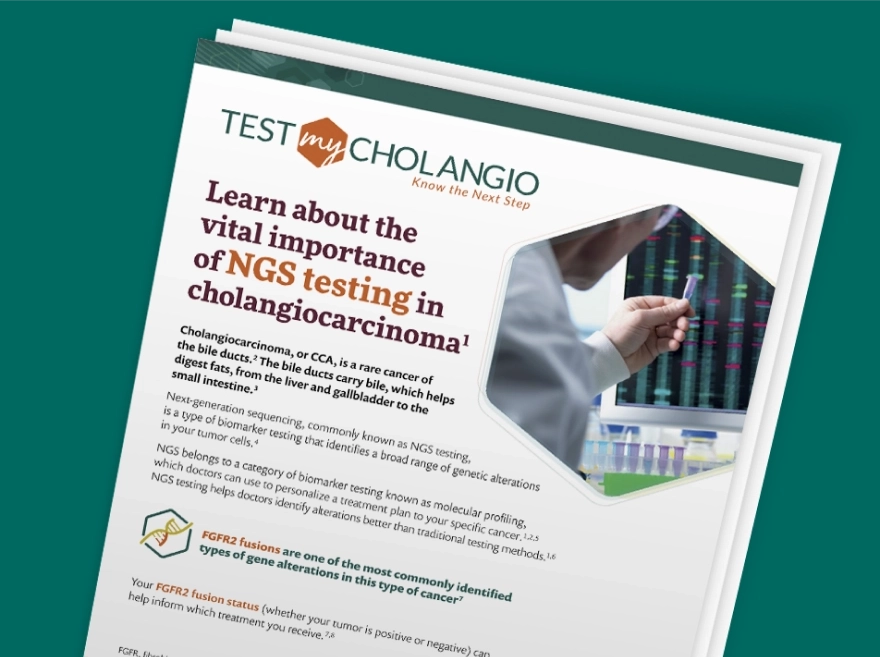
Talk to Your Oncologist Today About Biomarker Testing
This guide includes questions you may want to ask your oncologist about CCA and biomarker testing to help you get the conversation started.
Download the Discussion Guide
When to talk to your oncologist about biomarker testing
Since biomarker testing can provide information that may help direct the way your disease is managed, the Cholangiocarcinoma Foundation recommends testing as soon as possible. For this reason, you should talk to your oncologist about biomarker testing after your diagnosis, ideally before a biopsy is performed.
If your oncologist performed a biopsy but did not order biomarker testing, it may not be too late. An additional biopsy may be needed to provide enough tissue for biomarker testing. Talk to your oncologist and ask if biomarker testing is still possible.
The National Comprehensive Cancer Network® (NCCN®) recommends that doctors perform biomarker testing when the tumor cannot be removed by surgery or when the cancer is metastatic,* meaning it has spread to other parts of the body.
However, even if some time has passed since your diagnosis, it may not be too late to talk to your oncologist about biomarker testing.
*Referenced with permission from the NCCN Guidelines for Patients® for Gallbladder and Bile Duct Cancers, 2023. © National Comprehensive Cancer Network, Inc. 2023. All rights reserved. Accessed November 6, 2024. To view the most recent and complete version of the NCCN Guidelines for Patients, visit NCCN.org/patientguidelines. NCCN makes no warranties of any kind whatsoever regarding their content, use or application and disclaims any responsibility for their application or use in any way.
NGS Testing Guide for Patients
NGS is a form of biomarker testing that identifies a broad range of genetic alterations in tumor cells. This PDF brochure explains what you need to know about the role of comprehensive biomarker testing.
Ask your doctor about your opinions and whether comprehensive biomarker testing can help determine the right care plan for your unique CCA.
Download the NGS Testing Guide
How biomarker testing can help find abnormal gene changes in your tumor
Cancer is often caused by one or more genes in your body that have changed. There are different types of abnormal gene changes or defects that can cause CCA. Some of these changes include:
Mutation
This is a change to a specific portion of a normal DNA sequence within a gene.
Gene amplification
This occurs when the number of copies of a gene is increased beyond what is normal.
Gene fusion
This occurs when parts of two different genes become joined together.
Over time, advances in technology have given healthcare professionals the ability to look closely into tumors to identify specific gene changes or defects. This kind of detailed tumor study is called biomarker testing. As scientists and healthcare professionals continue to study tumors, new gene changes or defects are being discovered.
“Genetic” testing vs “genomic” testing
Genetics and genomics are two terms you might come across as you look for information about CCA. While these words sound similar, they mean different things:
Genetics
refers to the study of single genes and how they are involved in passing down specific traits from parents to their children. Genetic testing helps identify genetic conditions that run in the family that may be inherited, such as sickle cell anemia and cystic fibrosis.
Genomics
is the study of how all of a person's genes interact with each other and the environment. Biomarker testing is a type of genomic test that looks for abnormal gene changes inside cancer cells.
Your healthcare team may be able to use biomarker testing to identify the specific genomic mutations unique to your tumor. This information can help them develop a care plan for your unique CCA.
How biomarker testing works
Among your care team, your oncologist is responsible for ordering biomarker testing.
- A small sample, called a tissue biopsy, will be removed from your tumor.
- Your tumor sample is then sent to a special laboratory where tests will be performed to find unique characteristics of your tumor (biomarkers). These biomarkers can be genes or other molecules that signal if disease is present.
- A list of the types of genes found in the cells from your tumor sample is then compared to normal samples for reference.
- Your oncologist receives a report with the results.

